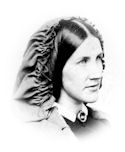May 19th. The division moved this morning to St. James Church; when the column was formed, the colonel ordered me back to the White House, to tell Broom to fetch up the regimental wagons. I rather liked the idea of riding back, although the road was lonesome and a little risky for a man alone; about half way, I met the colonel’s brother traveling in search of the regiment, half scared to death through fear of being captured. He was delighted to see me, and so we dismounted, and over a beverage he detailed all the news and gossip from the rear; amongst other things, he says that our forces in the valley are being roughly handled, and that at Washington there is quite a scare. Jackson has been detached from Lee’s army, and is making things lively there. What a shame it is McClellan does not pitch into them here promptly, and take advantage of Jackson’s absence. After a comfortable chat we parted company, and I rode along, meeting no one, until close to the White House, where I passed an immense drove of cattle, and apparently an endless string of wagons; by good luck, I ran across Quartermaster Demarest, of the Sixty-sixth, in charge of the brigade train, and asked him to send our wagons up to the regiment, which he promised to do. After taking a look at the immense piles of stores, and prodigious number of wagons. I rode back, overtaking Doctor McDermot, of the Sixty-sixth, on his way to join the regiment, which belongs to our brigade, and so we rode together. He is a rollicking, jovial, drinking, Charles O’Malley style of surgeon, and made the journey back most agreeable. We lost our way once, and had a narrow escape from running into the enemy’s mounted pickets, whom we saw uncomfortably close, but arrived in camp safely, about four o’clock.
The regiment is encamped around St. James Church, situated about a mile north of the Chickahominy. It is a very ancient and interesting little church, built of brick brought from England, in shape a parallelogram, having a small belfry at one end and a heavy porch and entrance at the other. There are many simple tablets on the walls, commemorating the virtues of some of the early settlers in these parts, and under the floor and in the church yard, many vaults and tombstones. Upon one of these I read the date 1725, which is quite old for this country. Some of the natives here claim Washington was married in this church, and frequently attended worship in it; I do not know whether this is true or not; now the poor old church is doing duty as a stable for cavalry horses, the pews having been taken out and piled up on the ground. Of course, they are gradually disappearing and will soon be all burned up.





